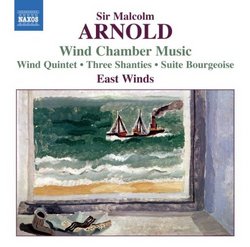| All Artists: Malcolm Arnold, East Winds Ensemble, Paul Chilvers Title: Arnold: Wind Chamber Music Members Wishing: 0 Total Copies: 0 Label: Naxos Original Release Date: 1/1/2007 Re-Release Date: 5/29/2007 Genres: Soundtracks, Classical Styles: Chamber Music, Forms & Genres, Short Forms, Historical Periods, Classical (c.1770-1830), Instruments, Keyboard, Reeds & Winds Number of Discs: 1 SwapaCD Credits: 1 UPC: 747313029471 |
Search - Malcolm Arnold, East Winds Ensemble, Paul Chilvers :: Arnold: Wind Chamber Music
 | Malcolm Arnold, East Winds Ensemble, Paul Chilvers Arnold: Wind Chamber Music Genres: Soundtracks, Classical |
Larger Image |
CD Details |
CD ReviewsSassy Wind Chamber Music from One of England's Grand Old Men J Scott Morrison | Middlebury VT, USA | 06/22/2007 (5 out of 5 stars) "Sir Malcolm Arnold OBE was born in 1921 and died only a few months ago, in September 2006. He was primarily known to most people as the composer of some fine film music -- Bridge on the River Kwai, Hobson's Choice, Inn of the Sixth Happiness among them -- but in latter years there have been several series of releases of his concert music, including wonderful performances of all nine of his symphonies on two different labels, Chandos and Naxos. There has been some sniffing about his light-heartedness and prolixity, but his stature as a major composer of the latter part of the twentieth century is now assured. He wrote a good deal of chamber music, often for friends from his days of playing in the London Philharmonic, but it tends not to be known except to specialists. This CD helps to remedy that by presenting many of his works for chamber ensembles featuring woodwinds, played by members of a fine American wind quintet called East Winds, in some pieces supplemented by additional players.
This CD contains 30 bands comprising seventeen different works. Most of them have the 'Arnold sound', which could be characterized as light and neoclassical. His music is often jazz-tinged, usually of the sassy Frenchified sort. It is difficult to hear much of Arnold's wind music without beginning to smile. He writes wonderful hummable tunes that stick in the memory, and he has a talent for color and rhythmic invention. Several of the performances here are world premiere recordings: a wind octet arrangement of the overture to 'Hobson's Choice' (that delicious 1954 film starring Charles Laughton) done with Arnold's permission by Uwe Radok; 'Dream City', written when Arnold was seventeen as a piano piece for his mother and arranged for wind quintet, again with Arnold's blessing, by Paul Harris; 'Grand Fantasia' for piano, flute and clarinet; 'Overture for Wind Octet' (1940); and 'Fantasy for Flute and Clarinet'. I particularly loved the insouciance of the 1940 'Grand Fantasia', written under a pseudonym ('A. Youngman', get it? -- he was only nineteen at the time) as a mood-lifter during the Battle of Britain. It was a year later that Arnold joined the London Philharmonic as second trumpet, eventually rising to the principal's chair. For some reason the 'Duo for Two Clarinets', a late six-movement work, is played as interludes between other shorter pieces. It was written in 1988, after he had concluded the Ninth Symphony and has some of that work's dark, brooding quality mixed in with Arnold's usual wit. Probably Arnold's most familiar wind quintet music is his 'Three Shanties', finished just after the Second Wind Quintet (which opens this CD and is brilliantly played), it is a set of rollicking tunes, including the familiar 'What shall we do with a drunken sailor?'. The performances here are all one could ask for. I'd never heard of 'East Winds' before and have some suspicion that they may be an ad hoc group, but whoever and wherever they are, they are marvelous. If you're a fan of Arnold's music and want to explore the chamber music for winds, this CD is for you. Scott Morrison" |
